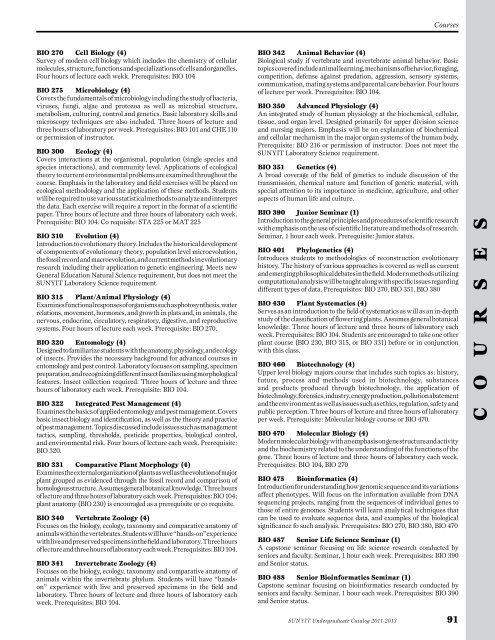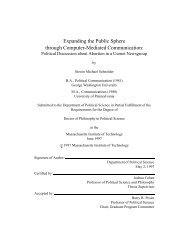Undergraduate Catalog 2011-2013 - SUNY Institute of Technology
Undergraduate Catalog 2011-2013 - SUNY Institute of Technology
Undergraduate Catalog 2011-2013 - SUNY Institute of Technology
Create successful ePaper yourself
Turn your PDF publications into a flip-book with our unique Google optimized e-Paper software.
Courses<br />
BIO 270 Cell Biology (4)<br />
Survey <strong>of</strong> modern cell biology which includes the chemistry <strong>of</strong> cellular<br />
molecules, structure, functions and specializations <strong>of</strong> cells and organelles.<br />
Four hours <strong>of</strong> lecture each wekk. Prerequisites: BIO 104<br />
BIO 275 Microbiology (4)<br />
Covers the fundamentals <strong>of</strong> microbiology including the study <strong>of</strong> bacteria,<br />
viruses, fungi, algae and protozoa as well as microbial structure,<br />
metabolism, culturing, control and genetics. Basic laboratory skills and<br />
microscopy techniques are also included. Three hours <strong>of</strong> lecture and<br />
three hours <strong>of</strong> laboratory per week. Prerequisites: BIO 101 and CHE 110<br />
or permission <strong>of</strong> instructor.<br />
BIO 300 Ecology (4)<br />
Covers interactions at the organismal, population (single species and<br />
species interactions), and community level. Applications <strong>of</strong> ecological<br />
theory to current environmental problems are examined throughout the<br />
course. Emphasis in the laboratory and field exercises will be placed on<br />
ecological methodology and the application <strong>of</strong> these methods. Students<br />
will be required to use various statistical methods to analyze and interpret<br />
the data. Each exercise will require a report in the format <strong>of</strong> a scientific<br />
paper. Three hours <strong>of</strong> lecture and three hours <strong>of</strong> laboratory each week.<br />
Prerequisite: BIO 104. Co requisite: STA 225 or MAT 225<br />
BIO 310 Evolution (4)<br />
Introduction to evolutionary theory. Includes the historical development<br />
<strong>of</strong> components <strong>of</strong> evolutionary theory, population level microevolution,<br />
the fossil record and macroevolution, and current methods in evolutionary<br />
research including their application to genetic engineering. Meets new<br />
General Education Natural Science requirement, but does not meet the<br />
<strong>SUNY</strong>IT Laboratory Science requirement.<br />
BIO 315 Plant/Animal Physiology (4)<br />
Examines functional responses <strong>of</strong> organisms such as photosynthesis, water<br />
relations, movement, hormones, and growth in plats and, in animals, the<br />
nervous, endocrine, circulatory, respiratory, digestive, and reproductive<br />
systems. Four hours <strong>of</strong> lecture each week. Prerequisite: BIO 270.<br />
BIO 320 Entomology (4)<br />
Designed to familiarize students with the anatomy, physiology, and ecology<br />
<strong>of</strong> insects. Provides the necessary background for advanced courses in<br />
entomology and pest control. Laboratory focuses on sampling, specimen<br />
preparation, and recognizing different insect families using morphological<br />
features. Insect collection required. Three hours <strong>of</strong> lecture and three<br />
hours <strong>of</strong> laboratory each week. Prerequisite: BIO 104.<br />
BIO 322 Integrated Pest Management (4)<br />
Examines the basics <strong>of</strong> applied entomology and pest management. Covers<br />
basic insect biology and identification, as well as the theory and practice<br />
<strong>of</strong> pest management. Topics discussed include issues such as management<br />
tactics, sampling, thresholds, pesticide properties, biological control,<br />
and environmental risk. Four hours <strong>of</strong> lecture each week. Prerequisite:<br />
BIO 320.<br />
BIO 331 Comparative Plant Morphology (4)<br />
Examines the external organization <strong>of</strong> plants as well as the evolution <strong>of</strong> major<br />
plant grouped as evidenced through the fossil record and comparison <strong>of</strong><br />
homologous structure. Assumes general botanical knowledge. Three hours<br />
<strong>of</strong> lecture and three hours <strong>of</strong> laboratory each week. Prerequisites: BIO 104;<br />
plant anatomy (BIO 230) is encouraged as a prerequisite or co requisite.<br />
BIO 340 Vertebrate Zoology (4)<br />
Focuses on the biology, ecology, taxonomy and comparative anatomy <strong>of</strong><br />
animals within the vertebrates. Students will have “hands-on” experience<br />
with live and preserved specimens in the field and laboratory. Three hours<br />
<strong>of</strong> lecture and three hours <strong>of</strong> laboratory each week. Prerequisites: BIO 104.<br />
BIO 341 Invertebrate Zoology (4)<br />
Focuses on the biology, ecology, taxonomy and comparative anatomy <strong>of</strong><br />
animals within the invertebrate phylum. Students will have “handson”<br />
experience with live and preserved specimens in the field and<br />
laboratory. Three hours <strong>of</strong> lecture and three hours <strong>of</strong> laboratory each<br />
week. Prerequisites: BIO 104.<br />
BIO 342 Animal Behavior (4)<br />
Biological study if vertebrate and invertebrate animal behavior. Basic<br />
topics covered include animal learning, mechanisms <strong>of</strong> behavior, foraging,<br />
competition, defense against predation, aggression, sensory systems,<br />
communication, mating systems and parental care behavior. Four hours<br />
<strong>of</strong> lecture per week. Prerequisites: BIO 104.<br />
BIO 350 Advanced Physiology (4)<br />
An integrated study <strong>of</strong> human physiology at the biochemical, cellular,<br />
tissue, and organ level. Designed primarily for upper division science<br />
and nursing majors. Emphasis will be on explanation <strong>of</strong> biochemical<br />
and cellular mechanism in the major organ systems <strong>of</strong> the human body.<br />
Prerequisite: BIO 216 or permission <strong>of</strong> instructor. Does not meet the<br />
<strong>SUNY</strong>IT Laboratory Science requirement.<br />
BIO 351 Genetics (4)<br />
A broad coverage <strong>of</strong> the field <strong>of</strong> genetics to include discussion <strong>of</strong> the<br />
transmission, chemical nature and function <strong>of</strong> genetic material, with<br />
special attention to its importance in medicine, agriculture, and other<br />
aspects <strong>of</strong> human life and culture.<br />
BIO 390 Junior Seminar (1)<br />
Introduction to the general principles and procedures <strong>of</strong> scientific research<br />
with emphasis on the use <strong>of</strong> scientific literature and methods <strong>of</strong> research.<br />
Seminar, 1 hour each week. Prerequisite: Junior status.<br />
BIO 401 Phylogenetics (4)<br />
Introduces students to methodologies <strong>of</strong> reconstruction evolutionary<br />
history. The history <strong>of</strong> various approaches is covered as well as current<br />
and emerging philosophical debates in the field. Modern methods utilizing<br />
computational analysis will be taught along with specific issues regarding<br />
different types <strong>of</strong> data. Prerequisites: BIO 270, BIO 351, BIO 380<br />
BIO 430 Plant Systematics (4)<br />
Serves as an introduction to the field <strong>of</strong> systematics as will as an in-depth<br />
study <strong>of</strong> the classification <strong>of</strong> flowering plants. Assumes general botanical<br />
knowledge. Three hours <strong>of</strong> lecture and three hours <strong>of</strong> laboratory each<br />
week. Prerequisites: BIO 104. Students are encouraged to take one other<br />
plant course (BIO 230, BIO 315, or BIO 331) before or in conjunction<br />
with this class.<br />
BIO 460 Biotechnology (4)<br />
Upper level biology majors course that includes such topics as: history,<br />
future, process and methods used in biotechnology, substances<br />
and products produced through biotechnology, the application <strong>of</strong><br />
biotechnology, forensics, industry, energy production, pollution abatement<br />
and the environment as well as issues such as ethics, regulation, safety and<br />
public perception. Three hours <strong>of</strong> lecture and three hours <strong>of</strong> laboratory<br />
per week. Prerequisite: Molecular biology course or BIO 470.<br />
BIO 470 Molecular Biology (4)<br />
Modern molecular biology with an emphasis on gene structure and activity<br />
and the biochemistry related to the understanding <strong>of</strong> the functions <strong>of</strong> the<br />
gene. Three hours <strong>of</strong> lecture and three hours <strong>of</strong> laboratory each week.<br />
Prerequisites: BIO 104, BIO 270<br />
BIO 475 Bioinformatics (4)<br />
Introduction for understanding how genomic sequence and its variations<br />
affect phenotypes. Will focus on the information available from DNA<br />
sequencing projects, ranging from the sequences <strong>of</strong> individual genes to<br />
those <strong>of</strong> entire genomes. Students will learn analytical techniques that<br />
can be used to evaluate sequence data, and examples <strong>of</strong> the biological<br />
significance fo such analysis. Prerequisites: BIO 270, BIO 380, BIO 470<br />
BIO 487 Senior Life Science Seminar (1)<br />
A capstone seminar focusing on life science research conducted by<br />
seniors and faculty. Seminar, 1 hour each week. Prerequisites: BIO 390<br />
and Senior status.<br />
BIO 488 Senior Bioinformatics Seminar (1)<br />
Capstone seminar focusing on bioinformatics research conducted by<br />
seniors and faculty. Seminar, 1 hour each week. Prerequisites: BIO 390<br />
and Senior status.<br />
C O U R S E S<br />
<strong>SUNY</strong>IT <strong>Undergraduate</strong> <strong>Catalog</strong> <strong>2011</strong>-<strong>2013</strong> 91
















